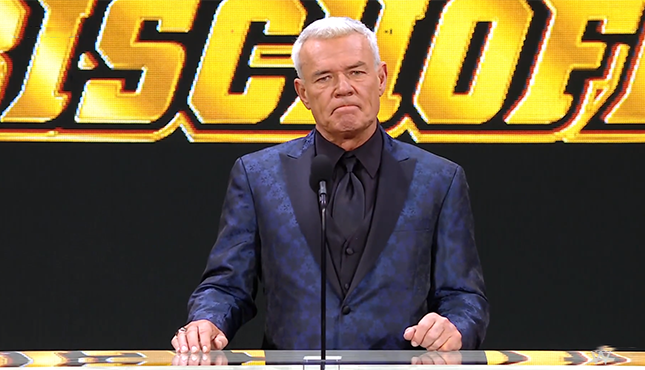wrestling / News
Eric Bischoff Explains Why He Prefers ‘Sports Entertainer’ To ‘Wrestler’
 Image Credit: WWE
Image Credit: WWE
On the latest episode of 83 Weeks, Eric Bischoff talked about WWE’s rise in 1998 in the Monday Night Wars with WCW, saying wrestler vs. sports entertainer and more. You can check out some highlights below:
On his frustration in 1998 and WWE’s rise: “The frustration started in ’98. It started specifically in August of 1998. Not going into the meeting again, I’ve talked about it a million times. That was when I first went, ‘What the fuck is going on? Who are these people over here, and why are they telling me what I should do?’ That started in 1998. Up until that moment in time and end of July, first week in August, yeah it was getting more competitive but it was still a blast. We were making money hand over fist, which I want to go back to, ‘Yeah, we should have put it [Hogan vs. Goldberg] on pay-per-view.’ We didn’t need money at that time. Our revenue was not our issue. Our issue was the fact that we were starting to lose ground and the brand was starting to lose market share. And the only way you can protect long-term revenue is to protect the market share that generates it. So our focus was absolutely on television. It was the only way you can retain, or in our case at this point, claw back some of the financial positions we had enjoyed and the revenue we were enjoying, is to the television up. Because if the television isn’t hot, guess what else is going to be hot? The pay-per-view.
“Now there’s about a six-month lag, maybe a little longer. But when you start losing ground in your television ratings, it doesn’t happen immediately, but you will then begin to see the deterioration in every other aspect of your business. Television drives everything. So, anybody that’s ever actually been in the television business, specifically the wrestling business… our focus right then in 1998 was clawing back our dominant position in terms of ratings because we knew everything else would follow. Think of it like throwing a rock in a pond. You throw the rock into a pond, it makes a big splash. But it takes a while for the ripples to get to the beach. And by the time they do, they’re not as noticeable. They keep coming, keep coming, and they erode the beach. In our case, the beach was revenue. So I will defend that position till I’m blue in the face. And anybody who actually has a business mind, particularly if they’ve been in television and in wrestling, will absolutely understand it. We were creating more revenue than we were projected to create back in [1997] when we put our budget to bed, and our forecasts. We were so far above our forecasts, it was ridiculous. So why would I hold something off to create revenue we didn’t need, what we really needed to do was stop the bleeding in terms of the erosion of our television ratings? Only a moron who’s never been in the industry would possibly argue that.”
On whether to use a wrestler or sports entertainer: “I guess everybody has a different definition and opinion. I like sports entertainers because again, it just resonates with me because wrestling is what wrestling is. It’s entertainment, first and foremost. But it is athletic and therefore, I guess you could call it a sport. Much like — I’m not even going to say it because I get so much fucking heat. I mean, people call bowling a sport, people call golf a sport. I’m not suggesting that it doesn’t take talent or that you don’t have to be a great athlete. Clearly, that’s obvious. But it’s more of a game than it is a sport. I can talk about that all day. And I could be convinced I’m wrong, pretty easily. It’s tough to distinguish between professional wrestling and sports entertainment for a lot of people.
“But I lean into sports entertainment because, first and foremost, it needs to be entertaining. If it’s not entertaining on multiple levels, it’s not going to be satisfying, and you’re not going to build and hold an audience. So I like sports entertainer. And I think it does a better job of defining what professional wrestling really is. I’m not offended by it. And I use professional wrestling often. They’re interchangeable for me. I think when you’re talking about what goes on inside the ring and Road Dogg talks about being a better sports entertainer, I kind of agree with that. Because in order to be successful, you have to be able to appeal to and resonate with a large part of the audience. They need to to love you or hate you, but they need to feel strongly one way or another. Thank you for being here for that sage advice. And I think Road Dogg is mostly right. You could argue with him. I could probably be convinced that I should argue with that. But that’s I feel right now.”
If you use any of the quotes in this article, please credit 83 Weeks with an h/t to 411mania.com for the transcription.







